Items filtered by date: July 2024
Fungus and Other Causes of Thick Toenails
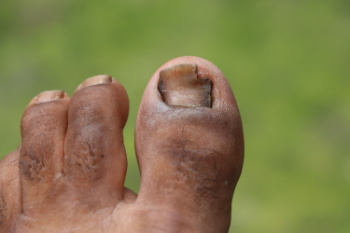
Thick toenails can be more than just a cosmetic issue. They often signal underlying health problems. One of the primary causes of thickened toenails is fungal infections, known as onychomycosis. This occurs when fungi infiltrate through small cracks or cuts in the nail or surrounding skin, where they thrive in the moist environment under the nail bed. This condition can worsen, leading to thicker nails that may change color, emit a foul odor, and become painful. Besides fungal infections, health issues such as psoriasis, congenital disorders, or chronic illnesses can also cause your toenails to thicken. Prompt and proper treatment from a podiatrist is essential, as untreated thick toenails can lead to further complications, including difficulty in walking and wearing shoes comfortably. If you notice a thickening of your toenails, it is suggested that you schedule an appointment with a podiatrist for an exam, diagnosis, and treatment options.
If left untreated, toenail fungus may spread to other toenails, skin, or even fingernails. If you suspect you have toenail fungus it is important to seek treatment right away. For more information about treatment, contact Monique Mitchell, DPM of Family Foot Centre. Our doctor can provide the care you need to keep you pain-free and on your feet.
Symptoms
- Warped or oddly shaped nails
- Yellowish nails
- Loose/separated nail
- Buildup of bits and pieces of nail fragments under the nail
- Brittle, broken, thickened nail
Treatment
If self-care strategies and over-the-counter medications does not help your fungus, your podiatrist may give you a prescription drug instead. Even if you find relief from your toenail fungus symptoms, you may experience a repeat infection in the future.
Prevention
In order to prevent getting toenail fungus in the future, you should always make sure to wash your feet with soap and water. After washing, it is important to dry your feet thoroughly especially in between the toes. When trimming your toenails, be sure to trim straight across instead of in a rounded shape. It is crucial not to cover up discolored nails with nail polish because that will prevent your nail from being able to “breathe”.
In some cases, surgical procedure may be needed to remove the toenail fungus. Consult with your podiatrist about the best treatment options for your case of toenail fungus.
If you have any questions, please feel free to contact our office located in Garden Hills, Nassau, Bahamas . We offer the newest diagnostic and treatment technologies for all your foot care needs.
How Psoriatic Arthritis Affects the Feet
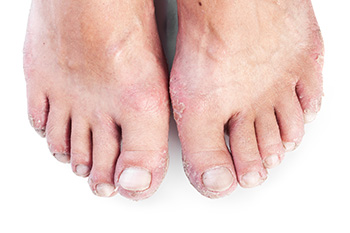 Psoriatic arthritis, or PsA, can significantly affect the feet, leading to symptoms like swelling, soreness, and stiffness. Walking or standing for prolonged periods may become uncomfortable, and shoes might feel tight due to swelling. Common issues resulting from psoriatic arthritis can include swelling of the ankle and big toe, plantar fasciitis, and pain in the Achilles tendon. Symptoms can fluctuate, so it is important to monitor and address them early. This can help to prevent long-term problems, such as an elongated big toe and stiff toe joints. A podiatrist can play a key role in managing symptoms of psoriatic arthritis by providing a treatment plan, which may include specific exercises and stretches that protect and maintain joint flexibility. A podiatrist also can recommend proper footwear and prescribe custom shoe orthotics to relieve pressure and offer stability. If you are experiencing foot pain resulting from psoriatic arthritis, it is suggested that you schedule an appointment with a podiatrist for an exam, diagnosis, and treatment options.
Psoriatic arthritis, or PsA, can significantly affect the feet, leading to symptoms like swelling, soreness, and stiffness. Walking or standing for prolonged periods may become uncomfortable, and shoes might feel tight due to swelling. Common issues resulting from psoriatic arthritis can include swelling of the ankle and big toe, plantar fasciitis, and pain in the Achilles tendon. Symptoms can fluctuate, so it is important to monitor and address them early. This can help to prevent long-term problems, such as an elongated big toe and stiff toe joints. A podiatrist can play a key role in managing symptoms of psoriatic arthritis by providing a treatment plan, which may include specific exercises and stretches that protect and maintain joint flexibility. A podiatrist also can recommend proper footwear and prescribe custom shoe orthotics to relieve pressure and offer stability. If you are experiencing foot pain resulting from psoriatic arthritis, it is suggested that you schedule an appointment with a podiatrist for an exam, diagnosis, and treatment options.
Arthritis can be a difficult condition to live with. If you are seeking treatment, contact Monique Mitchell, DPM from Family Foot Centre. Our doctor can provide the care you need to keep you pain-free and on your feet.
Arthritic Foot Care
Arthritis is a joint disorder that involves the inflammation of different joints in your body, such as those in your feet. Arthritis is often caused by a degenerative joint disease and causes mild to severe pain in all affected areas. In addition to this, swelling and stiffness in the affected joints can also be a common symptom of arthritis.
In many cases, wearing ill-fitting shoes can worsen the effects and pain of arthritis. Wearing shoes that have a lower heel and extra room can help your feet feel more comfortable. In cases of rheumatoid arthritis, the arch in your foot may become problematic. Buying shoes with proper arch support that contour to your feet can help immensely.
Alleviating Arthritic Pain
- Exercises that stretch the foot can prevent further pain and injury and increase mobility
- Most of the pain can be alleviated with anti-inflammatory drugs, heat, and topical medications
- Massages can help temporarily alleviate pain.
It is best to see your doctor for the treatment that is right for your needs and symptoms. Conditions vary, and a podiatrist can help you determine the right method of care for your feet.
If you have any questions, please feel free to contact our office located in Garden Hills, Nassau, Bahamas . We offer the newest diagnostic tools and technology to treat your foot and ankle needs.
Preventing Plantar Warts in Children
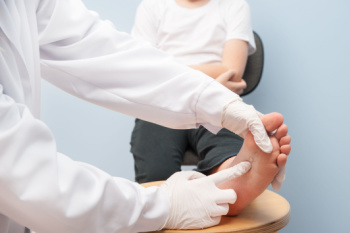
Plantar warts are a common issue in children, caused by the human papillomavirus, or HPV. These warts typically appear on the soles of the feet, causing discomfort and sometimes pain. The virus thrives in warm, moist environments, making public swimming pools, locker rooms, and communal showers common sources of infection. To prevent plantar warts, encourage children to wear protective footwear in these areas. Regularly washing feet and keeping them dry can also reduce the risk. It is important to avoid sharing shoes, socks, or towels to prevent the spread of the virus. If a child already has a plantar wart, covering it with a bandage can help prevent transmission. Promptly treating warts can also minimize discomfort and prevent them from spreading to others. Teaching children these habits can help protect them from plantar warts. If your child has developed a plantar wart, it is suggested that you visit a podiatrist who can properly treat this condition.
Plantar warts can be very uncomfortable. If you need your feet checked, contact Monique Mitchell, DPM from Family Foot Centre. Our doctor will assist you with all of your foot and ankle needs.
About Plantar Warts
Plantar warts are the result of HPV, or human papillomavirus, getting into open wounds on the feet. They are mostly found on the heels or balls of the feet.
While plantar warts are generally harmless, those experiencing excessive pain or those suffering from diabetes or a compromised immune system require immediate medical care. Plantar warts are easily diagnosed, usually through scraping off a bit of rough skin or by getting a biopsy.
Symptoms
- Lesions on the bottom of your feet, usually rough and grainy
- Hard or thick callused spots
- Wart seeds, which are small clotted blood vessels that look like little black spots
- Pain, discomfort, or tenderness of your feet when walking or standing
Treatment
- Freezing
- Electric tool removal
- Laser Treatment
- Topical Creams (prescription only)
- Over-the-counter medications
To help prevent developing plantar warts, avoid walking barefoot over abrasive surfaces that can cause cuts or wounds for HPV to get into. Avoiding direct contact with other warts, as well as not picking or rubbing existing warts, can help prevent the further spread of plantar warts. However, if you think you have developed plantar warts, speak to your podiatrist. He or she can diagnose the warts on your feet and recommend the appropriate treatment options.
If you have any questions please feel free to contact our office located in Garden Hills, Nassau, Bahamas . We offer the newest diagnostic and treatment technologies for all your foot and ankle needs.
Reasons for Wearing Heel Cups
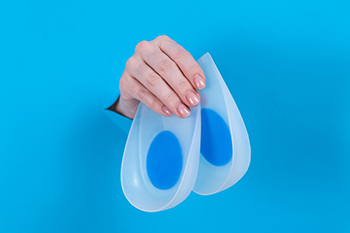
Heel cups are invaluable for individuals who spend long hours on their feet, providing essential support and cushioning to alleviate heel pain. These shoe inserts are particularly beneficial for those suffering from conditions like plantar fasciitis, which can be aggravated by insufficient support and poor shock absorption. Heel cups cushion the entire heel, from the point of impact with the ground to the edges and back, distributing the shock more evenly to reduce pressure on any single area. This helps make walking, running, and standing much more comfortable. Additionally, the gentle compression from heel cups can help reduce swelling in the heel and ankle. Professions such as nursing, retail, and culinary arts often involve prolonged standing. By using heel cups, people working in these fields can enhance their comfort and reduce heel pain. Consulting with a podiatrist can help in selecting the right heel cups and ensuring they are correctly fitted. If you experience heel pain, it is suggested that you make an appointment with a podiatrist for an exam and treatment.
Many people suffer from bouts of heel pain. For more information, contact Monique Mitchell, DPM of Family Foot Centre. Our doctor can provide the care you need to keep you pain-free and on your feet.
Causes of Heel Pain
Heel pain is often associated with plantar fasciitis. The plantar fascia is a band of tissues that extends along the bottom of the foot. A rip or tear in this ligament can cause inflammation of the tissue.
Achilles tendonitis is another cause of heel pain. Inflammation of the Achilles tendon will cause pain from fractures and muscle tearing. Lack of flexibility is also another symptom.
Heel spurs are another cause of pain. When the tissues of the plantar fascia undergo a great deal of stress, it can lead to ligament separation from the heel bone, causing heel spurs.
Why Might Heel Pain Occur?
- Wearing ill-fitting shoes
- Wearing non-supportive shoes
- Weight change
- Excessive running
Treatments
Heel pain should be treated as soon as possible for immediate results. Keeping your feet in a stress-free environment will help. If you suffer from Achilles tendonitis or plantar fasciitis, applying ice will reduce the swelling. Stretching before an exercise like running will help the muscles. Using all these tips will help make heel pain a condition of the past.
If you have any questions please contact our office located in Garden Hills, Nassau, Bahamas . We offer the newest diagnostic and treatment technologies for all your foot and ankle needs.
Treat Your Feet to Diabetic Shoes
Preventing Falls in Older People
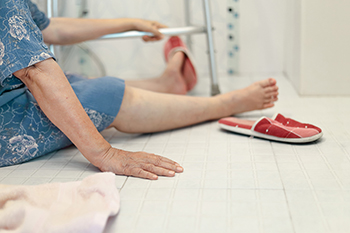 Falls are a significant concern for older adults, often resulting in serious injuries and decreased independence. Factors contributing to falls can include poor balance, muscle weakness, and foot problems such as neuropathy, arthritis, or wearing improperly fitted footwear. As we age, changes in vision and the side effects of medications can also increase the risk of falling. Preventing falls requires a proactive approach focusing on foot health. Older adults should regularly check their feet for any abnormalities and wear shoes that provide adequate support and have non-slip soles. Keeping floors clear of clutter, installing grab bars in bathrooms, and ensuring adequate lighting throughout the home can also help reduce fall risks. Engaging in regular physical activity, such as balance exercises and strength training, can improve stability and coordination. Additionally, reviewing medications with a healthcare provider can help identify those that may affect balance. If you are elderly and want to prevent the risk of falls and get help for any foot problems that might play a role, it is suggested that you visit a podiatrist regularly to maintain good foot health.
Falls are a significant concern for older adults, often resulting in serious injuries and decreased independence. Factors contributing to falls can include poor balance, muscle weakness, and foot problems such as neuropathy, arthritis, or wearing improperly fitted footwear. As we age, changes in vision and the side effects of medications can also increase the risk of falling. Preventing falls requires a proactive approach focusing on foot health. Older adults should regularly check their feet for any abnormalities and wear shoes that provide adequate support and have non-slip soles. Keeping floors clear of clutter, installing grab bars in bathrooms, and ensuring adequate lighting throughout the home can also help reduce fall risks. Engaging in regular physical activity, such as balance exercises and strength training, can improve stability and coordination. Additionally, reviewing medications with a healthcare provider can help identify those that may affect balance. If you are elderly and want to prevent the risk of falls and get help for any foot problems that might play a role, it is suggested that you visit a podiatrist regularly to maintain good foot health.
Preventing falls among the elderly is very important. If you are older and have fallen or fear that you are prone to falling, consult with Monique Mitchell, DPM from Family Foot Centre. Our doctor will assess your condition and provide you with quality advice and care.
Every 11 seconds, an elderly American is being treated in an emergency room for a fall related injury. Falls are the leading cause of head and hip injuries for those 65 and older. Due to decreases in strength, balance, senses, and lack of awareness, elderly persons are very susceptible to falling. Thankfully, there are a number of things older persons can do to prevent falls.
How to Prevent Falls
Some effective methods that older persons can do to prevent falls include:
- Enrolling in strength and balance exercise program to increase balance and strength
- Periodically having your sight and hearing checked
- Discuss any medications you have with a doctor to see if it increases the risk of falling
- Clearing the house of falling hazards and installing devices like grab bars and railings
- Utilizing a walker or cane
- Wearing shoes that provide good support and cushioning
- Talking to family members about falling and increasing awareness
Falling can be a traumatic and embarrassing experience for elderly persons; this can make them less willing to leave the house, and less willing to talk to someone about their fears of falling. Doing such things, however, will increase the likelihood of tripping or losing one’s balance. Knowing the causes of falling and how to prevent them is the best way to mitigate the risk of serious injury.
If you have any questions, please feel free to contact our office located in Garden Hills, Nassau, Bahamas . We offer the newest diagnostic and treatment technologies for all your foot care needs.

